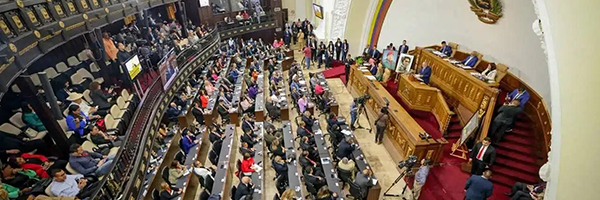Venezuela’s National Assembly Approves Law to Seize Assets Linked to Corruption
 Orinoco Tribune, April 1, 2023 —
Orinoco Tribune, April 1, 2023 —
The National Assembly (AN) of Venezuela has unanimously approved the Organic Law on Asset Forfeiture, a legal mechanism in the Venezuelan state’s fight against corruption and related crimes. The bill was approved in first discussion at a special session of the National Assembly held on Friday, March 31.
National Assembly deputy and chief of the PSUV bloc, Diosdado Cabello, presented before the plenary the bill, containing 46 articles in 4 chapter, to give legal effect to the seizure of properties linked to corruption and terrorism.
This law will allow the State to take ownership of seized assets related to criminal activities such as organized crime, financing of terrorism, legitimization of illicitly gained capital, and illicit trafficking of narcotic substances.
On presenting the bill, Deputy Diosdado Cabello emphasized that the law should not only include a reward for witnesses but also the protection of those who inform the authorities about corruption and drug trafficking. He also demanded that the authorities should be resolute against corruption and apply the law in all such cases.
“Everything that is the product of corruption must be returned to the people,” said the president of the National Assembly, Jorge Rodríguez, in his speech in the parliamentary session. He emphasized that everything must be seized from the corrupt, in the form and manner that is established in the Asset Forfeiture Law, which is based on a model promoted by the United Nations.
“No matter what”
Regarding the recent cases of corruption, Cabello stated that the “money stolen from the people” must be seized by the State.
Likewise, he stressed that acts of corruption cause great “indignation, chargin and anger in our people… so there will be no second chance. High morale to combat corruption no matter what.”
As for the properties seized from the corrupt people, Cabello stated that they are waiting for the criminal trial to end, after which the new law can be applied to the seized assets.
Cabello pointed out that the new law has the provision to be applied retrospectively, that is, it can be applied to cases of corruption that had occurred prior to the approval of the law.
National Assembly President Jorge Rodríguez said, “If we do not address the issue of corruption as a system, we will not be able to eradicate corruption as a whole.”
While the text of the law was being read at the parliament, Rodríguez gave several examples of what the law will imply, such as what would happen to judges who negotiate with criminals. It was also announced that anyone who brings to the attention of relevant authorities any act of corruption will be rewarded by the State.
